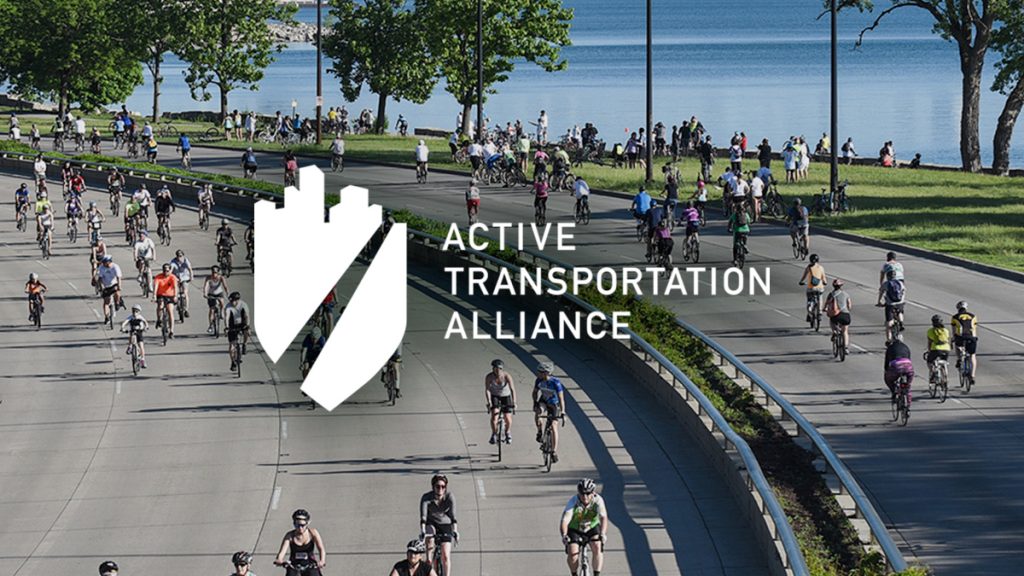FOR IMMEDIATE RELEASE
Media release
October 17, 2016
Media contact:
Ted Villaire
Communications Director
Active Transportation Alliance
(o) 312-216-0484
(c) 312-563-1118
[email protected]
Active Transportation Alliance releases action plan for a continuous Chicago River Trail
Advocates say time is right for a continuous trail that runs along and in some places over the Chicago River
Chicago, Ill.: Oct. 17, 2016 — Today the Active Transportation Alliance is releasing a Chicago River Trail Action Plan, which lays out key steps to create a continuous trail on the north and south branches of the Chicago River within Chicago that connects to existing trails in the suburbs.
An executive summary of the action plan with an overview map is now available.
While Chicago’s lakefront park and trail system is second to none, the Chicago River has not yet reached its full potential as a place for community recreation and alternative transportation. To change that, the Active Trans is embarking on a campaign to create a continuous trail along the Chicago River.
“The public demand for more off-street trails runs deep, as demonstrated by the overwhelming success of existing urban trails like the Lakefront Trail and Bloomingdale Trail,” said Ron Burke, executive director of the Active Transportation Alliance. “Not only would a complete river trail be a great boost for recreation and tourism while improving access to greenspace in many parts of the city, invariably, it’ll serve as a highway for healthy transportation.”
While talk of a continuous Chicago River Trail has a long history, recent initiatives, like the recently released Our Great Rivers vision has brought the idea back to forefront.
“Throughout Chicago and the suburbs, the community outreach for Our Great Rivers demonstrated that people and employers want continuous riverfront trails to commute to work, to connect us to park and forest preserves, and for good clean fun,” said Josh Ellis, director at the Metropolitan Planning Council, which partnered with Mayor Emanuel and his administration, Friends of the Chicago River and the Chicago Metropolitan Agency for Planning to develop Our Great Rivers, a vision for the Chicago, Calumet and Des Plaines rivers.
Nearly half of the 27 miles of Chicago’s riverfront has existing trail segments, and several more miles are slated for development over the next few years. While there are currently 14.8 miles of the Chicago River with no trail, 7 miles of river provide “near term opportunities” for creating new trail segments.
Active Trans has been working with community organizations in neighborhoods all along the river to discuss needs for the trail in local communities, how to improve river access, and upcoming development projects that may affect future trail sections.
“I’m glad to be working with Active Trans on creating this important resource for the Greater Chinatown area,” Debbie Liu, a representative from Coalition for a Better Chinese American Community. “This action plan will help people fully realize the river’s potential while guiding the way for making full use of our river for recreation and transportation beyond Ping Tom Park.”
A number of active and planned riverside developments create unique opportunities to reshape the landscape along the river and leverage private resources to complete new river trail segments. The El Paseo Trail project in Little Village and Pilsen, the south extension of the North Branch Trail, the downtown Riverwalk expansion, the Bridgeport rowing center, the Finkl Steel site, the enhancements at Lathrop Homes, and planned developments in the South Loop and on Goose Island are just a few examples of immediate opportunities to move the Chicago River Trail forward.
In some locations where riverbank is not available for a trail, new trail segments may need to float on the river or be built on a deck above the river, such as the planned Riverview Bridge between Clark Park and California Park on the North Branch.
Given that nearly 1 million Chicago residents live within one mile of the river, a continuous river trail has the potential to benefit a huge portion of the city, providing them with a new set of options for recreation, access to greenspace and healthy transportation.
To see the executive summary of the action plan, visit activetrans.org/sites/files/rivertrail.pdf.
# # #
The Active Transportation Alliance is a nonprofit, member-based advocacy organization that advocates for walking, bicycling and public transit to create healthy, sustainable and equitable communities. The organization works to build a movement around active transportation, encourage physical activity, increase safety and build a world-class transportation network. The Active Transportation Alliance is supported by more than 7,000 members and 1,000 volunteers. For more information about the Active Transportation Alliance, visit www.activetrans.org or call 312.427.3325.

